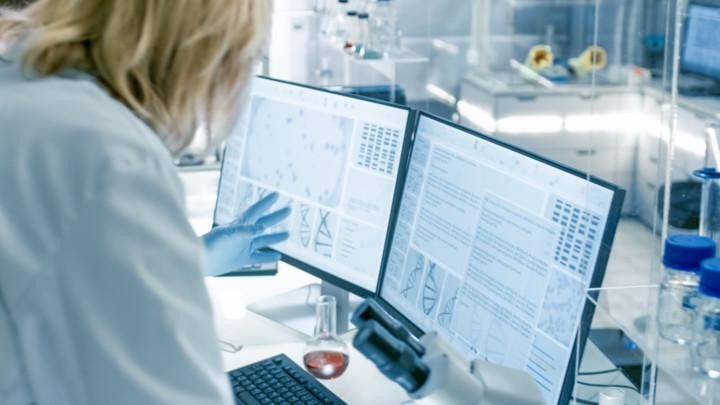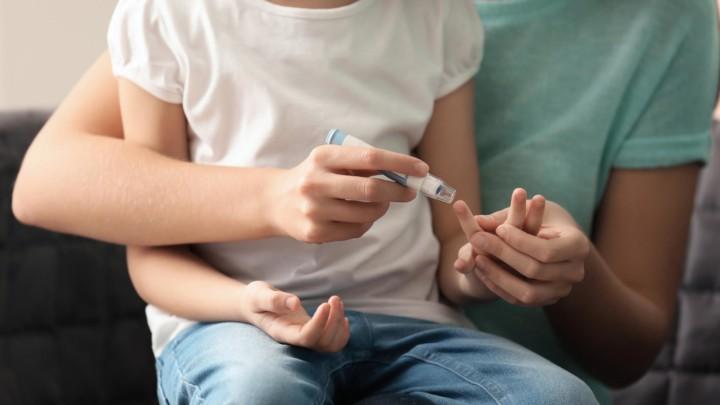
Heidi Loponen, Senior Scientific Consultant at MedEngine Oy, uses register data in a study aimed at validating the usefulness of a mathematical model for cancer treatments. “If this model proves effective, research data on cancer treatment can be produced with a smaller number of patients and more ethically in the future,” explains Loponen.
The MedEngine research team has reached an important milestone in its lung cancer study. Findata’s data permit process, which lasted almost a year, has been concluded. A permit to access the register has been granted, and data extraction is finally underway.
Takeda, the pharmaceutical company that commissioned the study, has previously investigated the possibility of using mathematical modelling to predict cancer growth. The goal is to develop a method for creating a virtual control arm for clinical trials. This method is experimental, and the purpose of the current registry study is to validate the method’s effectiveness.
“We are studying data concerning persons with advanced, non-small cell lung cancer. We are using a small sample of patients with a specific mutation that regulates the development of the cancer. The data will be collected from three hospital districts: Helsinki and Uusimaa, Pirkanmaa and Southwest Finland”, explains Heidi Loponen, who directs the study in MedEngine’s Medical Data Science team.
Lung cancer is the third most common type of cancer in Finland. Every year, approximately 2,800 people in Finland develop lung cancer. Data for the study have been extracted from specialised medical care registers through university hospitals’ information services and manual sampling using a data collection form.
“Our data set is unique. We collect from the patient information systems of specialised medical care both clinical data, including information on the spread of the disease and the treatments administered, and CT scan images that were taken during the treatment and transferred to Findata. The research team has a radiologist who measures parameters in the imaging files”, says Loponen.
New research methods to solve challenges of cancer treatment and research
Loponen describes the ongoing study as being part of a broader trend where clinical research and registry studies are coming closer together. Researchers also wish to make better use of data collected in the registers in clinical research. In particular, this trend can be seen in oncology, or cancer medicine, in which small patient groups are a typical feature.
“In clinical drug research, some cancer patients receive standard treatment, while others receive treatment whose efficacy is still being investigated but which has proven effective in early-stage studies. Designing randomised controlled studies with a small number of patients is difficult. This is why alternative methods are needed for conducting clinical research. Virtual control arms are one way to solve problems associated with clinical research”, Loponen explains.
In practice, building a virtual control arm could mean that no actual control group would be needed for clinical trials. The patients could serve as their own control subjects, or all control data would be collected as register data.
“If the method based on mathematical modelling which we are currently examining proves to be effective, it could be used to predict what would have happened to the patient’s cancer if they had continued with standard treatment instead of the treatment being studied. The use of the actual control arm would be avoided, which means that research data could be produced with a smaller number of patients and more ethically. This would also bring cost savings in clinical research”, says Loponen.
“A thorough preliminary study was needed for the data permit process, and this made communication with clinicians and controllers necessary even before the application was submitted. The person processing the application kept in touch with us very actively, and we discussed the application together.”
– Heidi Loponen, Senior Scientific Consultant, MedEngine Oy
Active dialogue throughout the application process
The data permit process covered an extensive data set and lasted almost a year. Takeda in the role of the client, university hospital clinicians, a radiologist and the MedEngine team, which was responsible for retrieving information from Findata and preparing the documentation, were all involved in this process. Close dialogue and cooperation played an important role during the data permit process.
“From the moment the application was accepted for processing, everything went well and happened relatively quickly. A thorough preliminary study was needed for the data permit process, and this made communication with clinicians and controllers necessary even before the application was submitted. The person processing the application kept in touch with us very actively, and we discussed the application together”, says Loponen, who was responsible for the project’s data permit application.
The processing of the application went well, and there were no unnecessary delays. However, Loponen notes that sufficiently short processing times are an important precondition for conducting research.
“The long waiting and handling times of permit processes as a whole are a problem. Due to these delays, Finland is losing opportunities for carrying out registry study projects”, Loponen says.
The project has already been an eventful journey towards results
Despite solid preparation and the preliminary study, surprises have not been avoided along the way. The research team has been called upon to carry out pioneering work.
The CT imaging data are examined in Findata’s Kapseli environment, which means that the radiologist must be present. Kapseli is Findata’s secure operating environment for processing data concerning individuals.
“We got the impression that imaging data of this type had not been previously processed in Kapseli, and that no standard software for processing it existed. The idea is to import software suitable for making measurements to Kapseli. This was a process that Findata was not familiar with, either, even if you could expect that imaging data would have been used in registry studies before”, Loponen says.
Kapseli’s environment meets the standards laid down in the Act on the Secondary Use of Health and Social Data and the General Data Protection Regulation, and the processing of data has been made easy for researchers from the information security perspective. Next, the research team will find out if the mathematical model works and if it can be used to predict how a patient’s cancer will grow.
Researcher’s tips for those applying for a data permit
“Justify your data needs and the extraction request as precisely as possible in your application. The more unambiguous the application, the better. You should contact the controllers of the data already at the planning stage of the study. The more carefully you complete the preliminary study, the fewer questions are raised when your application is being processed. This will prevent unnecessary delays in the processing of the application.“
– Heidi Loponen, Senior Scientific Consultant, MedEngine Oy
Read more
What is Findata?
- Launched in 2020, Findata is the data permit authority for the social and health care sector. Findata’s work is based on the Act on the Secondary Use of Health and Social Data, which entered into force in 2019.
- Among other things, Findata grants data permits for scientific research, statistics and official reporting duties. In addition to granting permits, it combines and pre-processes the data.
- Findata’s aim is to improve the information security of data sets containing health and social data and to enable the more efficient use of these sets.
- Findata operates in conjunction with the Finnish Institute for Health and Welfare but separately from the Institute’s other activities.
This article is part of the Datasta tutkimukseen (From data to research) article series published by Findata that sheds light on Findata’s activities and the changes brought about by the Act on the Secondary Use of Health and Social Data. In the series, we showcase studies that utilise data available through Findata.


